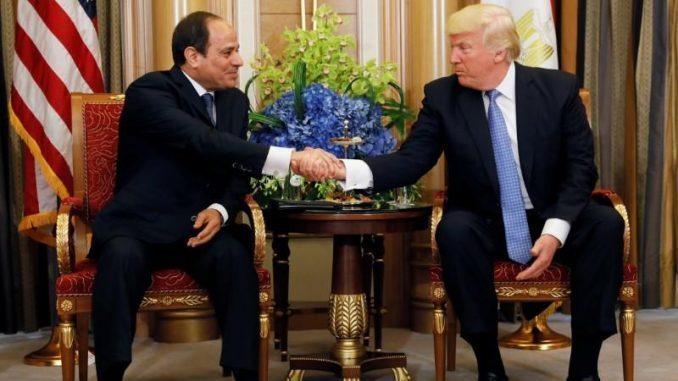
US President Donald Trump welcomed Egypt’s Abdel Fattah el-Sisi to the White House on Tuesday, and bestowed on his ally what he most eagerly sought: a ringing endorsement of his strongman rule, according to Mark Landler’s NYT report.
Mr. el-Sisi, 64, a former general who took power in a military coup in 2013, is seeking to amend the Egyptian Constitution to allow him to run for two more six-year terms, which would keep him in power until 2034.
When Mr. Trump was asked about the amendments, he professed not to know anything about them, but declared: “I can just tell you he’s doing a great job. Great president.”
Mr. el-Sisi’s visit came on the same day that another key ally of Mr. Trump’s in the Middle East, Prime Minister Benjamin Netanyahu of Israel, was facing voters in a tight election. In the weeks leading up to that vote, the president tried to shore up Mr. Netanyahu’s fortunes with a series of gestures, chief among them American recognition of Israel’s sovereignty over the Golan Heights.
It also came as Mr. Trump called a third ally, Crown Prince Mohammed bin Salman of Saudi Arabia, who has been under a cloud since reports that he ordered the killing in October of a Saudi dissident journalist, Jamal Khashoggi.
Mr. Trump and Prince Mohammed discussed Saudi Arabia’s “critical role” in stabilizing the region, the campaign to isolate Iran and “the importance of human rights issues,” according to a White House statement.
For Egypt’s leader, Mr. Trump offered only the trappings of an Oval Office welcome, though one with flashing cameras and looming boom mics. Back home, where Mr. el-Sisi has methodically stifled dissent and tightened his grip on power, that could prove more than enough validation.
“The single and only reason for President Sisi to visit the White House right now is to obtain a strong endorsement from President Trump to stay in power,” said Amy Hawthorne, the deputy director of research at the Project on Middle East Democracy. “He has calculated that he can intimidate his opponents and potential opponents with a show of support from Trump.”
Before their session, Mr. Trump said the two men would discuss trade and counterterrorism. He said nothing publicly about Egypt’s human rights record, which was always checkered but has deteriorated under Mr. el-Sisi, who has brutally suppressed the Muslim Brotherhood and turned Egypt into a society in which a person can be arrested over an objectionable Facebook post. Mr. Trump’s daughter Ivanka also met with Mr. el-Sisi to discuss the empowerment of women.
Mr. Trump said nothing about several Americans currently detained in Egypt. Earlier in the day, Secretary of State Mike Pompeo raised the issue with Mr. el-Sisi, according to the State Department.
For his part, Mr. el-Sisi said relations between Egypt and the United States had never been stronger. “All the credit goes to you, Mr. President,” he said through a translator. “Thank you very much for your support on all fronts.”
In fact, some analysts said, the United States alliance with Egypt is at an awkward moment. Mr. Trump has focused most of his energy in the region on assembling an Israeli and Persian Gulf alliance against Iran.
“When you think of Trump’s agenda in the Middle East, Egypt doesn’t offer that much,” said Brian Katulis, an expert on Egypt and senior fellow at the Center for American Progress. “What’s interesting to me is that Trump — who is always asking ‘what’s in it for us?’ — is even doing this meeting.”
Moreover, Egypt, which still receives roughly $1.3 billion a year in American military aid, recently agreed to buy 20 fighter jets from Russia, potentially exposing individual Egyptians to American sanctions.
Mr. Trump’s decision on the Golan Heights rankled Egyptian officials, as did his earlier order to move the United States Embassy in Israel from Tel Aviv to Jerusalem. Both moves run counter to the spirit of the peace treaty between Egypt and Israel, brokered 40 years ago by President Jimmy Carter.
They could also make it harder for Mr. el-Sisi to voice wholehearted public support for the Israeli-Palestinian peace plan being drafted by Mr. Trump’s son-in-law and senior adviser, Jared Kushner.
The administration has said it would present the plan sometime after the Israeli elections, but the White House, like the Israeli public, will have to await the results of Tuesday’s vote to determine whether Mr. Netanyahu or his opponent Benny Gantz, are able to form a governing coalition.
There is less suspense in Egyptian politics these days. Analysts said Mr. el-Sisi’s constitutional amendments, which also include a provision that would expand the military’s role, have drawn no public enthusiasm. But the electoral system is set up so that they can prevail with a simple majority even if voter turnout is low.
To coincide with Mr. Sisi’s visit, his critics began an online petition on Tuesday to oppose the amendments. The website was quickly blocked inside Egypt; the government has previously blocked several other independent or critical websites or online publications.
But the petition remained accessible outside Egypt and the website counter indicated that more than 67,000 people had endorsed it — a number that could not be confirmed. Egypt has permitted almost no public criticism of the proposals or organizing against them, but street signs urging a “yes” vote are common in Cairo.
“These amendments were cooked up inside the regime,” Ms. Hawthorne said. “They’ve had only Potemkin debates about them.”
President Barack Obama kept Mr. el-Sisi at a distance. But it was his second White House invitation from Mr. Trump, who has obviously established a rapport with him. At a meeting in Saudi Arabia in May 2017, the two lavished praise on each other, with Mr. Trump even declaring: “Love your shoes. Boy, those shoes.”
Some of Mr. Trump’s affection may be explained by his general affinity for strongmen. At a recent speech to Republican supporters, the president recalled an exchange he claimed to have had with President Xi Jinping of China, who, like Mr. el-Sisi, pushed for an extension of his term.
Mr. Trump said he referred to Mr. Xi as a king, which prompted the Chinese leader to demur that he was only a president.
“I said ‘No, you’re president for life, and therefore you’re king,’” Mr. Trump said he replied.
If Mr. el-Sisi succeeds in his drive to extend his term, he would serve as Egypt’s president until the age of 80 — unless he changes the Constitution again.



